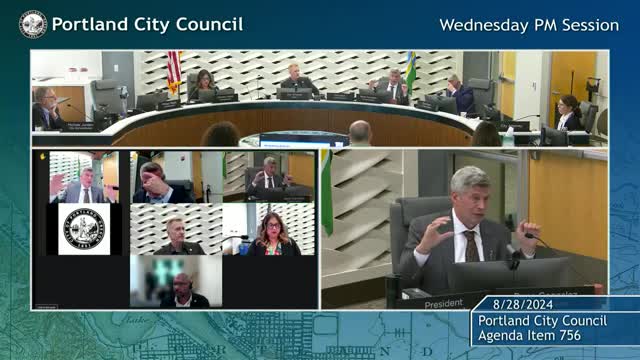Housing Crisis Deepens as Portland Faces Permit Decline
August 29, 2024 | Portland, Multnomah County, Oregon
This article was created by AI summarizing key points discussed. AI makes mistakes, so for full details and context, please refer to the video of the full meeting. Please report any errors so we can fix them. Report an error »

In a recent government meeting, officials discussed the ongoing challenges in Portland's housing market, particularly in relation to the impact of inclusionary zoning and the need for more affordable housing options. The conversation highlighted a significant reduction in building permits since the adoption of inclusionary housing policies, raising concerns about their effectiveness in generating sufficient market housing.
Commissioner Gonzalez expressed the need for a deeper analysis of whether inclusionary housing is meeting its goals, noting that while some affordable housing is being produced, the overall market housing generation remains alarmingly low. This disparity, he argued, could have broader implications for income levels across the city.
The discussion also touched on the recalibration of inclusionary housing policies, which expanded tax abatement eligibility to areas outside the central city as of March 1. However, officials acknowledged that the anticipated influx of projects taking advantage of these incentives has yet to materialize. Comparisons were made to Seattle, where higher income levels allow for greater housing production, suggesting that Portland's lower income levels are a barrier to similar growth.
Commissioner Ryan raised concerns about the outreach efforts conducted during the housing needs analysis, emphasizing the importance of including voices from larger developers who are actively involved in building multifamily units. He advocated for a balanced perspective that incorporates both advocates for housing and those responsible for its construction.
The meeting also highlighted the need for more targeted lobbying efforts in Salem to address the housing needs of essential workers, particularly those earning between 30% and 60% of the area median income (AMI). Officials acknowledged that the current income brackets may not adequately reflect the realities faced by many residents, with significant gaps leaving some individuals without affordable housing options.
As the meeting concluded, there was a consensus on the importance of continuous improvement in housing policies and a commitment to further study the evolving needs of Portland's diverse population, particularly in the context of aging in place and workforce housing.
Commissioner Gonzalez expressed the need for a deeper analysis of whether inclusionary housing is meeting its goals, noting that while some affordable housing is being produced, the overall market housing generation remains alarmingly low. This disparity, he argued, could have broader implications for income levels across the city.
The discussion also touched on the recalibration of inclusionary housing policies, which expanded tax abatement eligibility to areas outside the central city as of March 1. However, officials acknowledged that the anticipated influx of projects taking advantage of these incentives has yet to materialize. Comparisons were made to Seattle, where higher income levels allow for greater housing production, suggesting that Portland's lower income levels are a barrier to similar growth.
Commissioner Ryan raised concerns about the outreach efforts conducted during the housing needs analysis, emphasizing the importance of including voices from larger developers who are actively involved in building multifamily units. He advocated for a balanced perspective that incorporates both advocates for housing and those responsible for its construction.
The meeting also highlighted the need for more targeted lobbying efforts in Salem to address the housing needs of essential workers, particularly those earning between 30% and 60% of the area median income (AMI). Officials acknowledged that the current income brackets may not adequately reflect the realities faced by many residents, with significant gaps leaving some individuals without affordable housing options.
As the meeting concluded, there was a consensus on the importance of continuous improvement in housing policies and a commitment to further study the evolving needs of Portland's diverse population, particularly in the context of aging in place and workforce housing.
View full meeting
This article is based on a recent meeting—watch the full video and explore the complete transcript for deeper insights into the discussion.
View full meeting
